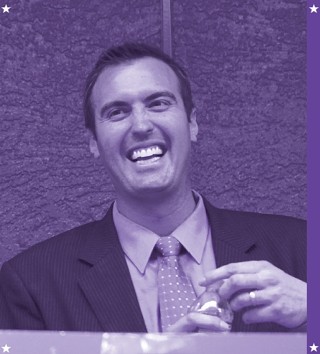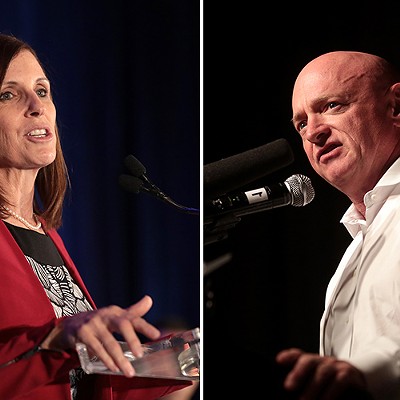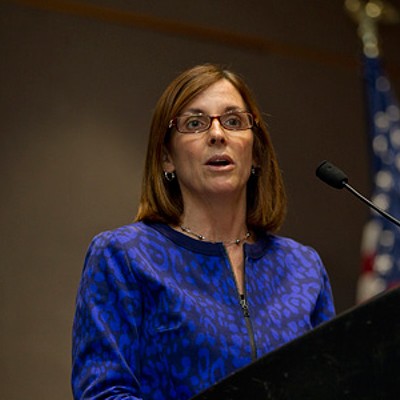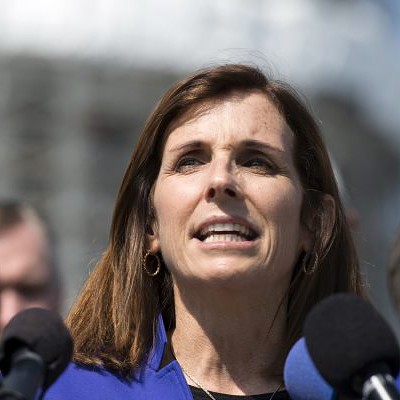The political newcomer in the race is Martha McSally, whom most voters had never heard of before she announced her plan to run for Congress in CD 8.
McSally, who is turning 46 this week, has an impressive résumé. She was the first female fighter pilot in the Air Force, flying combat missions over Iraq. She was the first female squadron commander when she took over A-10 Thunderbolt II planes in the 354th Fighter Squadron, which was stationed at D-M and saw action over Afghanistan. She earned a master's degree at Harvard's John F. Kennedy School of Government.
In 2001, McSally made headlines—including an appearance on 60 Minutes—when she sued the Pentagon over a regulation that required her to wear native dress while traveling off-base in Saudi Arabia.
McSally retired in 2010 at the rank of colonel and was teaching international security courses at the George C. Marshall European Center for Security Studies in Germany when she heard that Giffords was stepping down.
"We're at a critical time as a nation and as a community," McSally said. "Our government needs leadership; our government needs direction."
McSally got a burst of publicity in mid-February during an appearance on Fox and Friends, when she told host Steve Doocy that she'd like to kick Republican presidential candidate Rick Santorum "in the jimmy" for his comments about the role of women in combat.
When it comes to military issues and international affairs, McSally's expertise comes across. She has no heartburn over the decision to rescind "Don't Ask, Don't Tell" and allow gays and lesbians to serve openly in the military. She believes women should be able to serve in combat. She appreciates the complexity of navigating the politics of the Middle East and refrains from criticizing every move the Obama administration makes in the region.
But McSally admitted in a February interview that she had plenty to learn about a host of civilian issues, ranging from Social Security and Medicare reform to the proposed Rosemont mine.
"As I'm getting my campaign off the ground, there's a myriad of issues that we need to look at. And I'd like to hear from all sides on many of these issues, to try to come up with a thoughtful, analytical approach that looks at the math of what we're facing right now with our national debt, and figuring out how we can get our national debt under control." McSally said. "So as I hear from different experts on their proposals in order to deal with a variety of these different issues, including Medicare, I'd be happy to listen to them and make an assessment."
Asked under what circumstances she believes abortion should be legal, McSally had a simple answer: "I believe in the sanctity of all human life."
When pressed on whether she believed that women who are the victims of rape or incest should be allowed to have an abortion, McSally said she doesn't believe it's an issue she needs to worry about as a member of Congress.
"The legislators are not really involved in this issue right now," she said. "We have a Supreme Court decision, and so I'll be focusing on things that the House of Representatives needs to be doing."
While McSally stumbles on some policy points and tiptoes around others, it's yet to be seen whether she'll start engaging on policy matters or buy into the Kelly method of tossing red meat to the base.
But last month, she demonstrated a willingness to provide a reality check on one of Kelly's more-fantastical positions. Kelly was speaking at a Tea Party rally on the day of Arizona's GOP primary when he declared that there was no reason for an energy crisis in America.
"I do find it laughable when they talk about the energy crisis, the energy shortage, when we have so much here in this country," Kelly said. "We have so much coal, so much oil, so much natural gas. We have everything we need right here. Three decades ago, they told us there were 800 millions barrels of oil existing in the world. Today, because of technology, there's over a trillion. So apparently it is the renewable resource we've all been talking about!"
McSally challenged Kelly's joke in a statement to the press.
"We need to secure our energy future now, not make jokes about it," McSally said. "Folks, this is a serious issue that is affecting everyone in our country. Gas prices are rising at a record rate. Consumption of petroleum products around the world is increasing rapidly—and will continue to increase long into the future."
McSally added that she supported more domestic production of oil, but said the real solutions were more complex than Kelly made them out to be.
"We also have to work with our allies across the globe to ensure the stability of key oil-producing regions elsewhere," she said. "This is a complex issue, and no one is going to solve it with a one-liner. We need real solutions. We need leaders with the strategic national and international experience to address these problems swiftly and logically. Leave the jokes to Leno."
McSally's push-back against Kelly was a rare moment when one of the other candidates has challenged him for being an unserious—and essentially immature—candidate.
It could be a fertile line of attack in a general election, but it may not have much payoff with the GOP base—and that's one reason you don't see more of it.
At a series of debates and forums last week, the candidates continued making their cases for themselves—but they did little to knock down Kelly. It's a stark difference from the GOP presidential debates, during which White House hopefuls have torn into each other's records on health care, earmarks and other policies.
As long as the other candidates lay off him, Kelly can make the argument that he came close to knocking off Giffords in 2010, and that he's now ready to "finish the job."
But Kelly's strong showing had a lot to do with the mood of the district, which reflected the mood of the entire country, which handed over control of the House of Representatives to the GOP. It remains to be seen how that mood has shifted in Congressional District 8 in the wake of the January 2011 shooting rampage.
Over the next few weeks, the focus—such as it is—will be on the GOP candidates and how voters respond to these last few weeks of debates and persuasion attempts. Will they stick with the guy they know in Jesse Kelly? Will they move on to Frank Antenori? Will those two divide up enough of the Tea Party vote to allow Sitton to get through? Or will they gamble on the new face of McSally?
Whoever wins the primary will face Democrat Ron Barber just two months after the primary. Barber will have a solid Democratic Party unified behind him, as well as the endorsement of Giffords and her husband, former astronaut Mark Kelly.
Barber, a longtime aide to Giffords, was also shot on Jan. 8. He's lucky to be alive; bullets missed major arteries when they ripped through his face, neck and an upper leg while he stood talking with federal Judge John Roll, who was killed.
Barber's experience in the district, combined with Giffords' endorsement, makes him a formidable candidate. He's already picking up crossover support in the CD 8 race from Republicans, including Tucson City Councilman Steve Kozachik, former Tucson Mayor Bob Walkup, former Sahuarita Mayor Lynne Skelton and former Sierra Vista Mayor Bob Strain.
Barber will also benefit from the deep experience that Team Giffords built with early-voter lists and other get-out-the-vote machinery.
Earlier this week, Barber announced that he was not only seeking to complete Giffords' term as a placeholder—he's also going to run for the new Congressional District 2 seat in the fall.
While CD 2 covers much of the same area as CD 8, the Republicans lose almost their entire voter-registration advantage as GOP-leaning precincts in Marana, Oro Valley and SaddleBrooke move over to CD 1, and Hispanic and Democratic precincts from Congressman Raúl Grijalva's district slide into CD 2.
In other words: The district, which now leans Republican, will get a whole lot more favorable to Democrats—and those voters probably aren't going to be persuaded by the same speeches that light up the Republicans in Precinct 388.



















